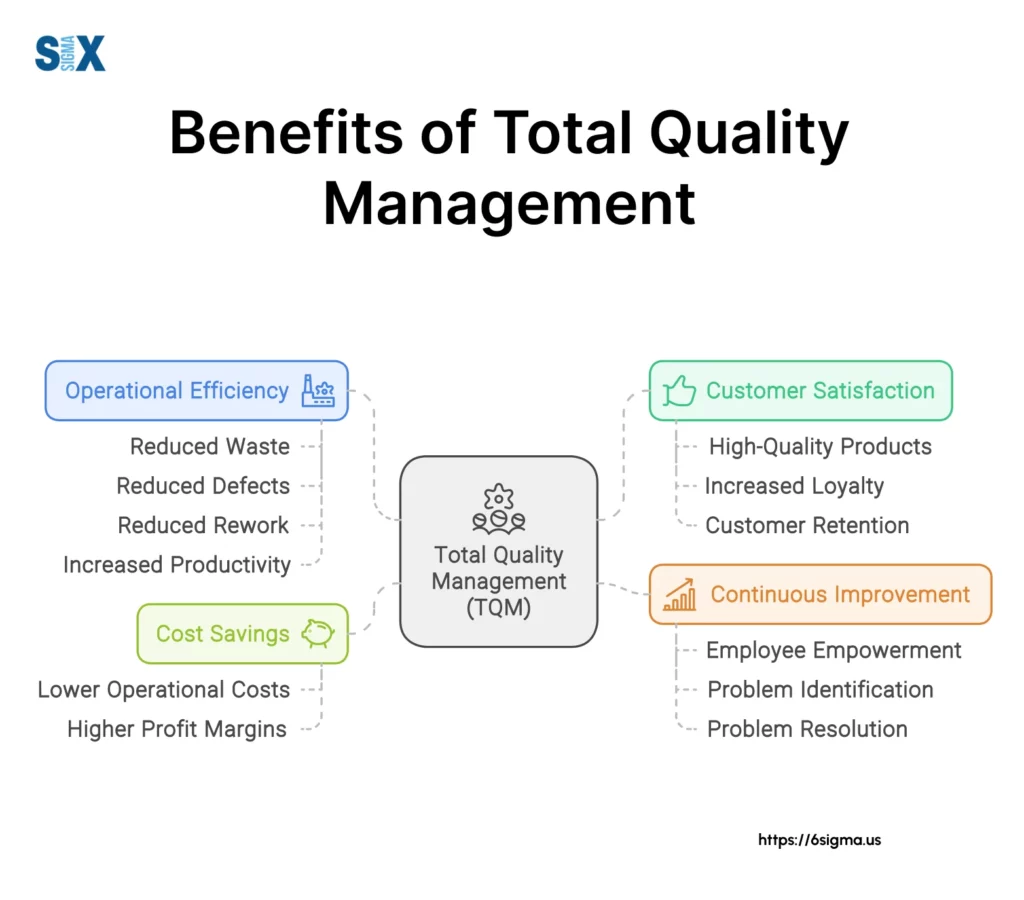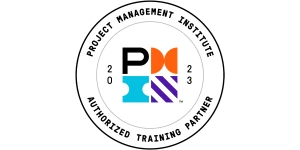Understanding the Key Benefits of Total Quality Management
TQM (Total Quality Management) is a comprehensive approach to organizational management that seeks to improve quality and performance in all functions and at every level.
It emphasizes long-term success through customer satisfaction, employee involvement, and continuous improvement.
Key Highlights
- Understanding TQM
- Key benefits of Total Quality Management (TQM)
- How TQM impact the culture of an organization
- Implementing TQM for excellence
- TQM’s effect on stakeholders
- Adapting TQM for modern businesses
- Future of TQM
Introduction to Total Quality Management
Total Quality Management (TQM) transforms countless organizations.
Definition and Core Principles
Total Quality Management is a comprehensive strategy that aims to infuse quality into every aspect of an organization.
TQM is about creating a system where quality is everyone’s responsibility, from the shop floor to the C-suite. The core principles of TQM include:
- Customer focus
- Total employee involvement
- Process-centered approach
- Integrated system
- Strategic and systematic approach
- Continual improvement
- Fact-based decision making
- Communications
These principles work in concert to create a holistic approach to quality management that permeates every level of an organization.

Historical Development of TQM
The roots of TQM can be traced back to the early 20th century, but it truly came into its own in post-World War II Japan.
W. Edwards Deming, often considered the father of quality management, played a crucial role in Japan’s economic recovery by introducing statistical process control techniques.
In the 1980s, as Japanese companies began outperforming their American counterparts, U.S. businesses started adopting the principles and the benefits of Total Quality Management.
This led to the creation of quality awards like the Malcolm Baldrige National Quality Award in 1987, which further popularized TQM concepts.
Throughout my career, I’ve witnessed the evolution and the benefits of Total Quality Management (TQM), from its initial focus on manufacturing to its current application across all sectors, including service industries and government institutions.
Key Benefits of Total Quality Management
Implementing TQM across various organizations, can have numerous tangible benefits. Let’s explore the benefits of Total Quality Management (TQM) in detail.
Enhanced Customer Satisfaction and Retention
TQM is about meeting and exceeding customer expectations.
By focusing on customer needs at every stage of the production or service delivery process, organizations can significantly boost customer satisfaction.
Improved Product and Service Quality
TQM’s emphasis on continuous improvement and defect reduction naturally leads to enhanced product and service quality.
Increased Employee Engagement and Empowerment
One of the most powerful aspects of TQM is its focus on total employee involvement.
By empowering employees at all levels to contribute to quality improvement efforts, organizations can tap into a wealth of knowledge and creativity.
Cost Reduction and Waste Elimination
TQM’s process-centered approach helps identify and eliminate inefficiencies and waste.
Strengthened Competitive Advantage
By consistently delivering high-quality products and services, organizations can differentiate themselves in the marketplace.
Companies like GE use TQM principles to maintain their competitive edge and dominate their respective markets.
Benefits of Total Quality Management (TQM) & Impact on Organizational Culture
Implementing TQM is not just about changing processes; it’s about transforming the entire organizational culture.
Fostering a Culture of Continuous Improvement
One of the key benefits of Total Quality Management (TQM) instills a mindset of constant improvement.
Organizations that successfully adopt TQM see their employees proactively seeking ways to enhance their work, rather than waiting for top-down directives.
Promoting Cross-functional Teamwork
TQM breaks down silos and encourages collaboration across departments.
Cross-functional projects solve complex quality issues, leading to breakthrough innovations.
Encouraging Data-driven Decision Making
One of the key principles and benefits of Total Quality Management (TQM) is fact-based decision making.
Organizations implement robust data collection and analysis systems, enabling them to make more informed decisions and predict potential quality issues before they occur.
Leadership Commitment and Its Role in TQM Success
The success of TQM initiatives hinges on leadership commitment.
Implementing TQM for Operational Excellence
Achieving operational excellence through TQM requires a systematic approach to implementation.
Process Standardization and Efficiency
Standardizing processes is crucial for maintaining consistent quality.
Quality Control and Assurance Mechanisms
Robust quality control and assurance mechanisms are the backbone of TQM.
Organizations implement statistical process control charts, failure mode and effects analysis (FMEA), and other quality tools to detect and prevent defects proactively.
Performance Metrics and Measurement
As the saying goes, “You can’t improve what you don’t measure“.
Implementing key performance indicators (KPIs) and balanced scorecards is a crucial part of TQM implementations, providing organizations with clear visibility into their quality performance.
Lean manufacturing and Six Sigma integration
Integrating Lean principles and Six Sigma methodologies with TQM can lead to powerful results.
Combining these approaches can reduce cycle times and improve first-pass yield.
Benefits of Total Quality Management (TQM) & Influence on Stakeholder Relationships
The benefits of Total Quality Management (TQM) extend beyond the organization to its entire ecosystem of stakeholders.
Improving supplier relationships and quality
TQM emphasizes the importance of supplier partnerships.
Organizations implement supplier quality management programs that not only improved input quality but also fostered long-term, mutually beneficial relationships with key suppliers.
Enhancing Stakeholder Value
By improving overall organizational performance, TQM directly contributes to increased stakeholder value.
Whether it’s higher returns for shareholders or better services for the public in government institutions, TQM delivers value across the board.
Building Customer Loyalty and Market Share Growth
Consistent quality leads to customer loyalty.
Organizations that fully embrace the benefits of Total Quality Management (TQM) often see significant increases in customer retention rates and, consequently, market share growth.
Adapting TQM for Modern Business Challenges
As business landscapes evolve, so too must our approach to TQM.
Innovation management in TQM
Innovation is crucial.
Organizations integrate innovation management into their TQM frameworks, ensuring that quality improvement doesn’t come at the expense of creativity and innovation.
Risk Management and Adaptability to Change
TQM principles can be leveraged for effective risk management and change adaptation.
TQM tools develop a comprehensive risk assessment and mitigation strategy, improving the company’s resilience to market fluctuations.
TQM in the Digital Age: Leveraging Technology
The advent of big data and artificial intelligence has opened up new possibilities for TQM.
Machine learning algorithms help to predict quality issues in real-time, allowing for proactive interventions.
The Future of Total Quality Management
As we look to the future, TQM is evolving to incorporate more predictive analytics, AI-driven quality control, and increased focus on sustainability.
The principles and benefits of Total Quality Management (TQM) will remain relevant, but the tools and techniques will continue to advance.
Long-term Sustainability and Benefits of Total Quality Management (TQM) Practices
Organizations that stick with TQM for the long haul reap significant benefits.
The continuous improvement culture fostered by the benefits of Total Quality Management (TQM) ensures that these organizations are always adapting, always improving, and always delivering value to their customers and stakeholders.
In conclusion, the benefits of Total Quality Management are far-reaching and transformative.
From enhanced customer satisfaction to improved operational efficiency, the benefits of Total Quality Management (TQM) provides a comprehensive framework for organizational excellence.
SixSigma.us offers both Live Virtual classes as well as Online Self-Paced training. Most option includes access to the same great Master Black Belt instructors that teach our World Class in-person sessions. Sign-up today!
Virtual Classroom Training Programs Self-Paced Online Training Programs







